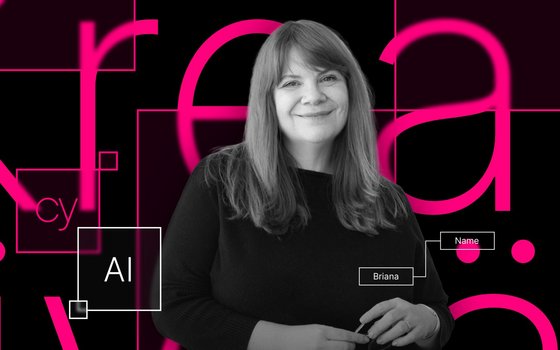AI - artificial intelligence(beast)?
31. March 2023
Author:
Gerald Merkel (cyperfection)
Reading time:
12 min
Tags:
Creativity, SEO, digital visibility, copywriting, human-led AI
![[Translate to English:] [Translate to English:]](/fileadmin/_processed_/2/b/csm_Blog_Header_Gerald_f5aa3fdc0b.jpg)
Artificial intelligences have been the talk of the town for a few weeks now. They are the better search engines, they can write text that would make David Ogilvy spin in his grave, they paint like Dali and Van Gogh at the same time, and in Minnesota ChatGTP even passes the law exam. In Bavaria, however, the same AI fails the Abitur. Last but not least, since I can only prove that I have the Hessian Abitur and have only studied public law as a minor subject and certainly not in Minnesota, I'm happy to leave it at that and stick to my job: to classify and assess possibilities, current and future, for working in our industry from a professional perspective. That's exactly what my fantastic colleague Briana already did recently in her readable and nuanced post. Why now this one more? Spoiler: The basic premise was that our perspectives diverge in interesting ways.
A few thoughts later, after re-reading her post and of course experimenting around with AIs it turns out: We end up barely diverging in our assessment of how our work with and without AIs will play out in the future. The contradictory nature of us humans and the sheer force of rationality shake hands here. Briana and I as agency archetypes: She, the curious-playful creative, I, the skeptical-analytical writer with patches at the elbow. But the result is a very similar professional assessment, which will be wonderful to work with, precisely because of certain different starting perspectives. That's what we call a team - AIs, can you create such symbioses?
ChatGPT & colleagues - text forge and writing workshop?
Two frequently heard statements about ChatGPT:
- Clear briefings are the be-all and end-all
- Reproducing existing is ok, creatively creating something really new rather not.
On my request to look for a name for a text agency, which creates a reference to the craft, as expected "Textschmiede" is spit out" (on "Schreibwerkstatt" also ran a few bets). So it runs. A bit of suggestive asking, and the classic among the not-so-creative name-findings comes up, even the first time. Certainly not an exhaustive example, but it really shows that using a text AI is worthwhile especially if you have clear ideas and formulate them as clearly as possible. And it is advantageous when it comes to short, simple contexts - perhaps headlines? Yes and no. You can try it yourself, but if you add a bit of originality and context, the first results are usually disappointing. It needs refinements, further briefings. And it quickly becomes apparent that the same amount of time is invested in working with the AI as would have been invested in one's own association factory.
The whole thing gets even more interesting with longer blog posts. The ratio between the time spent checking what an AI spits out and then tweaking your own brief vs. the time it would take to write yourself is harder to measure here. Information, structure, and up to a certain point the tone - all of this can be fine-tuned - but also in terms of the quality of the end result in exactly this hierarchy. One thing can be said: Especially when you are "at a loss", an AI can provide you with one or the other impulse under favorable circumstances, be it for the idea of a headline or a social media post. However, not so much in the sense that the AI spits out something that can be adopted. Rather as a kind of springboard: an idea or formulation that gets one's own chain of associations going.
Content (is) KI(ng)
The same applies to longer contributions, but to a much lesser extent. Tonalities are one thing. With a lot of effort and tugging, ChatGPT and co. can be brought close to a desired "sound". But only close. If you add specifications, such as texting around health claims or the like, and you demand a certain amount of liveliness, emotionality, wordplay and empathy from a text ... Well, there it is again, the opportunity for the writing workshop.
Especially in the healthcare and pharmaceutical sector, the topic of independent content, sympathetically and empathetically packaged, was on everyone's lips a few years ago under the keyword content marketing. If you look at what an AI produces in this direction, you quickly understand why again. Dry-as-dust, textbook-like or phrase-like knowledge transfer may fill websites with so-called content - but not with lasting and returning users. Particularly in the case of health-related topics, an AI has a clear structural disadvantage: it is in the best of health and it is not possible for it to transport, or rather transfer, experiences with the appropriate empathy. Short thematic outlier and reading tip: On the subject of AI and the processing of experiences and feelings in the field of art, the Australian musician and songwriter Nick Cave is worth reading.
Back to our spheres: Working with AI also has pitfalls. Associations and something like flow arise when writing. The AI may be faster (and it is impressively fast), but it doesn't get into a flow. The impression that working with it also prevents a flow, which then often provides the really readable ideas and passages, may be difficult to verify, but it runs through our entire work with the tools so far: In the end, we enter commands, wait to see what happens, and then check. Doing your own research and creative writing seems to trigger other synapses.
What is green and runs through the forest?
Do not be unfair: We didn't expect humor, even of the shallowest variety. But one point that illustrates the importance of human intervention and permanent meticulous control even for people without any text affinity: ChatGPT is not a search engine. Clear misinformation occurs frequently, even with the simplest lexical knowledge. At least it apologizes when it is "caught":


That's right, deer do not usually have green fur. Their fur is usually brown with white patches in the summer and more of a grayish brown in the winter. Sorry for my wrong answer before. When it comes to animals that are actually green, I can think of
At this point, at the latest, the time factor becomes very relative - a common assumption is that AIs will at least enable us to work faster. At the moment, in the phase of getting to know each other and trying things out, that is definitely not the case. On the contrary. Everything the AI says has to be cross-checked. All the more so because it says everything with conviction and it usually sounds conclusive at first. In this respect, it resembles a not untalented, but somewhat sloppy professional beginner, only it hardly makes any orthographic errors. And it is precisely this constellation that requires the greatest attention. For a text written by a human quickly shows that the author is not really well versed in the subject - this usually affects formulations and phrases. The style of the AI may be boring to read, but (often) does not allow such conclusions. What unfortunately shows that ChatGPT reaches its limits is the repetition of content when it is actually about going deeper into topics. Then it is often repeated what has already been written, just formulated differently.
How do we learn to love AI?
A carpenter uses a screwdriver - usually a touch more confidently than even the skilled recreational do-it-yourselfer. Nevertheless, you have yet to hear of a carpenter who advertises that he is a screwdriver specialist. To pick up on a phrase from the previous post, "So there always - really always - has to be a human being." That should be indisputable. My differentiation to this: If it seems reasonable, an AI may also be there. But not even then it has to. My appeal to the agency industry, to all creatives, developers, copywriters as well as in management and including all colleagues in marketing as well as journalists etc. etc.: Despite all the noise in the marketplace of the global digital village, let's keep it clear in our minds that we are and will be the specialists who can confidently choose which tools we use. Namely, the ones that lend themselves to deliver better or equally good results. In the digital age, there have been new tools for us all the time and that will continue. AIs, as we are now getting to know them, will shape up and soon take forms that have little to do with the current versions. Let's remain specialists in copy, designs, UX, and more. No carpenter likes to do without his screwdrivers - why should he, no one can handle them better.
![[Translate to English:] [Translate to English:]](/fileadmin/_processed_/6/e/csm_teaser-kwort-navi_f358dfaf2a.jpg)


